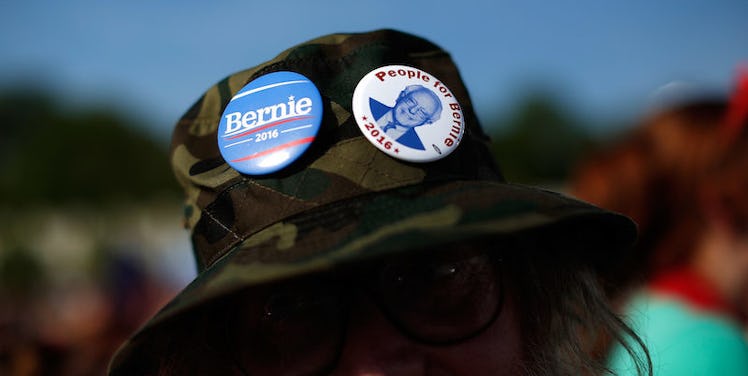
If Millennials Don't Vote In 2016, They Can't Complain About These 3 Things
Millennials are the largest and most diverse generation in US history, and they have the potential to make or break the 2016 presidential election.
With their progressive stances on a wide array of issues and fundamentally optimistic worldview, the country could definitely benefit from more Millennial participation in the political process.
Unfortunately, however, it looks like we might see yet another election in which only a fraction of the Millennial population actually votes.
A recent poll conducted by Rock the Vote and USA Today revealed only a small percentage of Millennials said they plan to vote in the Democratic (42 percent) and Republican (33 percent) primaries. And only around 60 percent said they are likely to vote in the general election.
But even though it appears voter turnout could be low for Millennials in 2016, that doesn't mean they don't care about the issues.
The poll found Millennials care a great deal about the economy, education, foreign policy, healthcare and gun laws.
A1: According to @USATODAY/@RockTheVote poll, these are Top 5 issues important to Millennials #VoteUSA pic.twitter.com/RbwXLsLXYB — Rock the Vote (@RockTheVote) January 14, 2016
And this generation has strong stances on each of these issues, as 82 percent of Millennials said they believe the US should pass a law requiring background checks on all gun purchases, for example.
It's also not as if Millennials think voting isn't important, as 74 percent said it's a responsibility.
What this all goes to show is this generation has a complex relationship with the political process, and we need to work harder to convince young people the issues they care about are being prioritized.
Ashley Spillane, president of Rock the Vote, took some time earlier this week to speak with Elite Daily about the poll and its broader implications. As she put it,
Attitudes around voting a clearly are mixed... Young people need to be engaged by the candidates and need to feel like the issues they care about are being addressed in order for them to want to participate in the process. Right now this election is largely focused on the older demographic, because that’s who they expect to show up.
Indeed, a separate poll, conducted by GenFKD, revealed 86 percent of Millennials feel the 2016 presidential candidates aren't addressing the issues they care about. In other words, Millennials feel ignored.
Obviously, the candidates need to do a better job engaging with young people.
But it's not all on them.
Millennials need to get out and vote, and not just in the general election. It's time for this generation to prove the country wrong and send a powerful message that we do care about America's future.
And if Millennials don't vote in 2016, they have no right to complain about these three things...
They can't complain if their favorite candidate doesn't get elected.
If you want the candidate you prefer to be elected in 2016, you have to vote, plain and simple.
For example, Rock the Vote found most Millennials identify as Democrats (41 percent). And Sen. Bernie Sanders leads the Democratic field among Millennials, with 46 percent saying they'd vote for him if the Democratic primary was held today.
While Sanders has surged in recent polls, many older Democrats clearly favor former Secretary of State Hillary Clinton.
Thus, if Millennials who want Bernie to get elected don't vote in the primaries, Clinton would likely become the Democratic nominee for president.
Voting doesn't guarantee the candidate you prefer will get elected, but not voting is a much surer way of helping them lose.
If you don't vote, don't complain about who's elected president.
They can't complain if the issues they care about are ignored.
As noted above, part of the reason candidates aren't engaging with young people is they don't believe they're likely to vote.
The more we vote, the more politicians will be forced to pay attention to that which concerns us.
Voting is our most fundamental duty as citizens. Not participating in the political process means allowing other people (older generations) to make the decisions that impact your life.
As Spillane aptly stated,
I don’t think anyone should be too busy to vote... The voting laws should certainly be changed to meet the needs of a 21st century electorate, but I do think participating in our democratic process is the most important thing you need to do.
America's political system is hardly perfect, but not participating is not an effective means of changing things.
They can't complain if the country is a mess in the future.
Voting is a way of investing in the future.
As Ashley Spillane contended,
Young people are now, and have always been, the future of the country. We need to make sure this generation, as they grow up, understands we have a responsibility to manage the country. Having an under-engaged group of young people leads to an under-engaged adult problem and the country can’t afford that in terms of the health of our democracy.
As corny as it sounds, we are the future. There is no better time than now to get involved and start taking responsibility for the direction of the nation.
There are many things about this country that require reform, from campaign finance to the criminal justice system.
But catalyzing change requires participation, and participation means voting.
Voting is not the only means of bringing about the changes our democracy necessitates, but that doesn't mean your vote doesn't count.
If you don't vote, you can't complain if the country is a mess in the future, because it means you did nothing to prevent it.